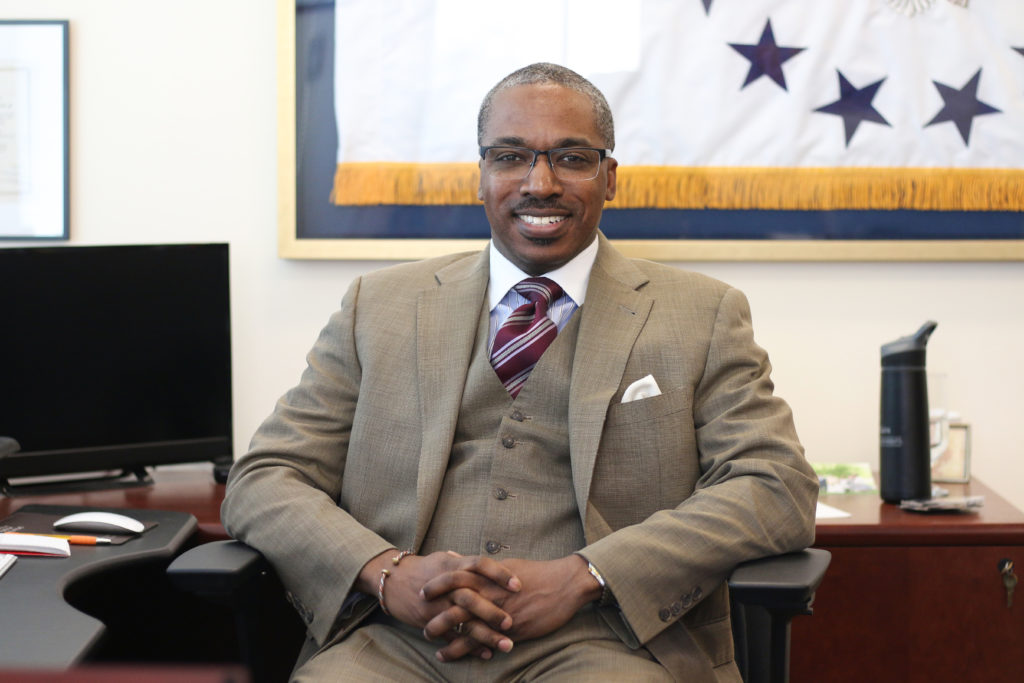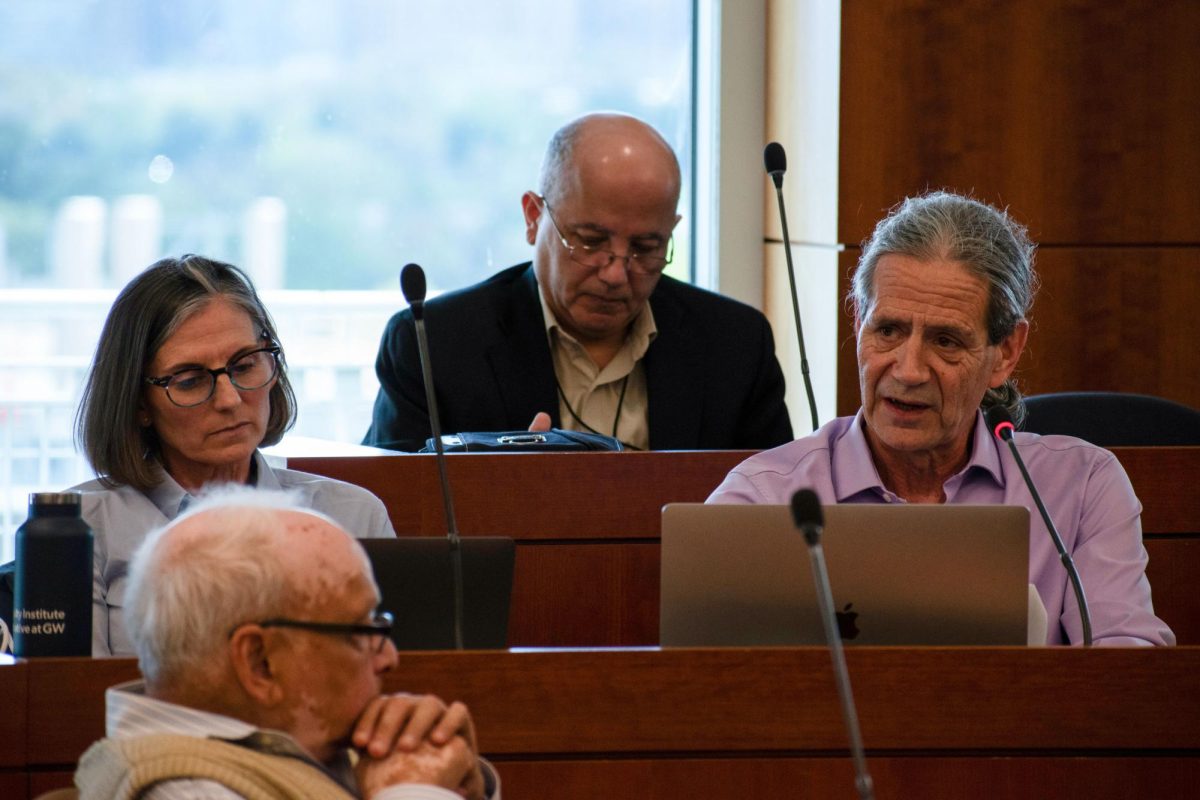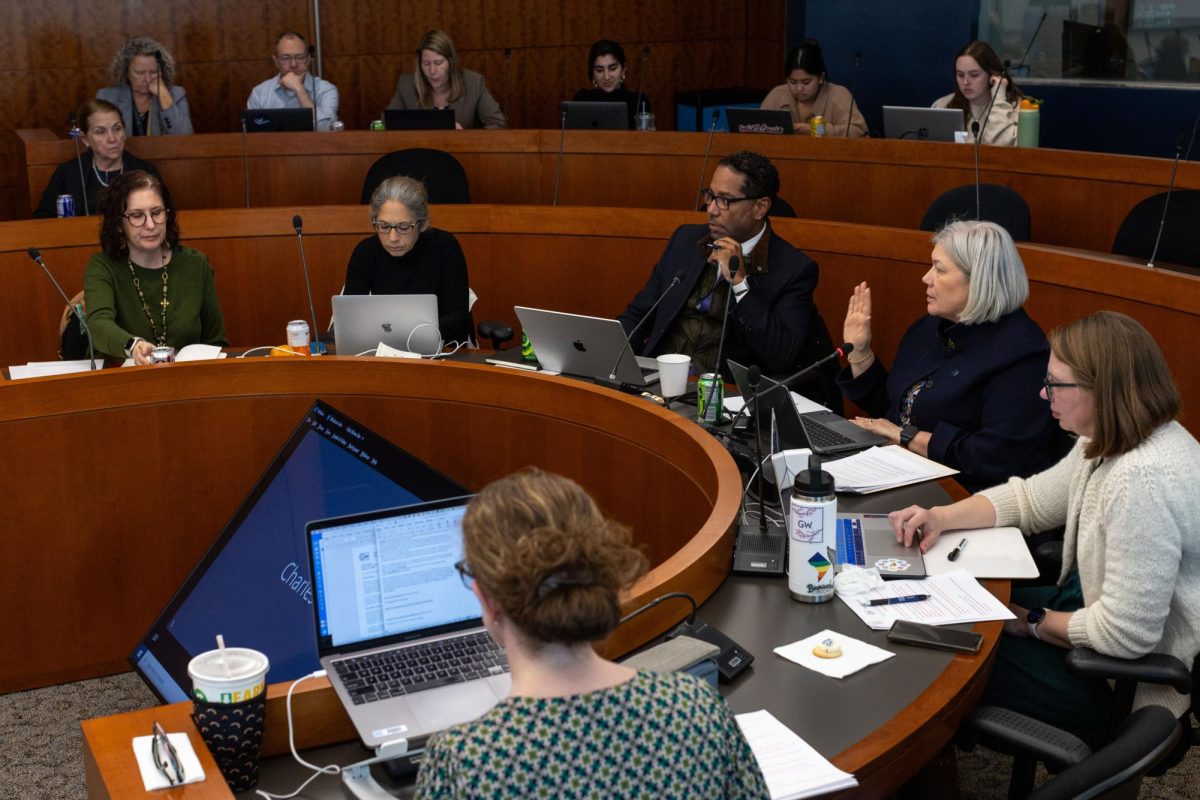When asked about his greatest accomplishments over his tenure as dean of the Elliott School of International Affairs, Reuben Brigety thought of alumnus Atem Malik.
Malik, who hails from South Sudan, received “critical financial assistance” from a donor, Brigety said. He now works for the pro-democracy nonprofit International Republican Institute on issues in Africa, and Brigety said he had “no doubt” that Malik will “go back in short order to help build South Sudan.”
“I have spent a great deal of time over the past five years seeking benefactors for the school, explaining our mission and the need to expand support for students like Atem,” Brigety said in an email. “It’s been challenging but also among the most rewarding of our accomplishments.”
As he prepares to depart the Elliott School after a half-decade at its helm, Brigety named new programs like the Leadership, Ethics and Practice Initiative, the creation of a full-time diversity program manager and the ability to garner donors as among his achievements in the position. Faculty said Brigety’s departure leaves a void in the Elliott School that the next dean can fill by continuing to embrace research and promoting African studies.
“It has been a great honor for me to have been your dean for these last five years,” Brigety said.
Brigety announced last week that he would step down from his post at the end of the semester to serve as president and vice-chancellor of Sewanee: The University of the South. After Brigety leaves, the Elliott School will be the seventh out of GW’s 10 schools to lose its leader since University President Thomas LeBlanc arrived on campus in 2017.
Prior to his start as dean, professors were hopeful that Brigety’s experience as U.S. Representative to the African Union and his expertise in African relations would beget new research centers and opportunities for students.
When Brigety arrived on campus in 2015, he emphasized a “collaborative and transparent” leadership approach and introduced the STEP model – scholarship, teaching, ethics and practice – to break down the areas he identified for improvement at the school.
One year into his tenure, Elliott School officials launched the Institute for African Studies, which has worked to increase its profile, hosting popular seminar series with experts and becoming a leader in both research and awareness pertaining to African studies since 2016.
The school under Brigety’s leadership also kicked off the Leadership, Ethics and Practice Initiative, which includes a speaker series and a review of the undergraduate curriculum to incorporate the LEAP framework across all of the school’s courses. Brigety spearheaded new diversity initiatives like unconscious bias training for faculty and staff after meeting with students over coffee to chat, a fixture of his time in office.
During his tenure as dean, he hosted speakers like French President Emmanuel Macron and NATO Secretary General Jens Stoltenberg.
Brigety said the most challenging part of his job has been attracting donors to support the school’s mission but added that donors have contributed to the creation of new research initiatives and offered direct support to students through scholarships.
“It’s been challenging but also among the most rewarding of our accomplishments,” Brigety said.
Brigety said the Office of the Provost will make the final announcement regarding an interim dean, but he advised his successor to capitalize on the school’s research programs to provide new opportunities to students.
“I hope that my successor continues to build on the strengths of the Elliott School, provides even more opportunities for our remarkable students, champions the important scholarship and research that advances the public debate on global issues and policy and, of course, continues to develop the next generation of leaders for the world,” he said.
Melani McAlister, a professor of international affairs and the director of undergraduate studies in the American studies department, said Brigety has made a “very important difference” in the school’s academics by founding and supporting the Institute for African Studies and its work.
McAlister cited Brigety’s “significant” contribution from the Elliott School to a conference she organized in 2017 to commemorate the 50th anniversary of the start of the Nigeria-Biafra Civil War in 1967 as an example of this commitment to exploring the increasingly relevant – yet often neglected – field of international affairs.
“Africa is understudied in most programs in international affairs, and his commitment to African studies is something that will positively impact the Elliott School and GW for many years to come,” McAlister said.
She said that while Brigety’s new opportunity at Sewanee is a “great step forward and exciting for him,” his successor will arrive at GW in the middle of intense debate over the future of the institution, given LeBlanc’s push to grow the ratio of STEM students to 30 percent of the undergraduate student body.
“At a time when students, staff and faculty are deeply angered about LeBlanc’s recent statements, GW is at a crisis point,” McAlister said. “I think it will be a challenge to replace Dean Brigety in that context. But we need somebody who can stand up for the value of what the Elliott School does and who will be part of a broader academic leadership that is willing to challenge the imperious behavior coming from the top.”
Brigety emphasized student and faculty research as one of his top priorities when he took the position of dean. Officials hosted the school’s first-ever interdisciplinary research conference last March, which allowed researchers from various departments to connect and share their research.
In April, the school overhauled its Undergraduate Research Scholars Program by creating the Dean’s Scholars Program, which gives students more time and funding to produce multi-year research projects.
Ned Lazarus, a visiting assistant professor of international affairs, said he hopes the next dean has a similar ability to Brigety in setting a “collegial, positive and energetic tone.”
“Dean Brigety has always been friendly, energetic, positive, very impressive in his presentations in faculty meetings – [he] knows his stuff,” Lazarus said. “He puts a lot of energy and enthusiasm into his work, [a] high emphasis on collegiality. I certainly see him as a great asset to the school.”
Brigety has also worked to integrate freshmen more thoroughly into the Elliott School by creating a mandatory first-year experience course on leadership development in 2018 and a revamped first-year retreat for incoming freshmen last April.
Andrew Zimmerman, a professor of history and international affairs and the acting president of the Faculty Association, said he has always had “very good feelings” for Brigety, especially after Brigety issued a ban in 2017 on events featuring all-male panels at the school to address “signs of gender bias” and to promote diverse viewpoints, despite receiving some faculty backlash.
“This is the kind of leadership that we need from administrators – one committed, not just in words but also in action, to excellence through diversity and inclusion,” Zimmerman said in an email.








